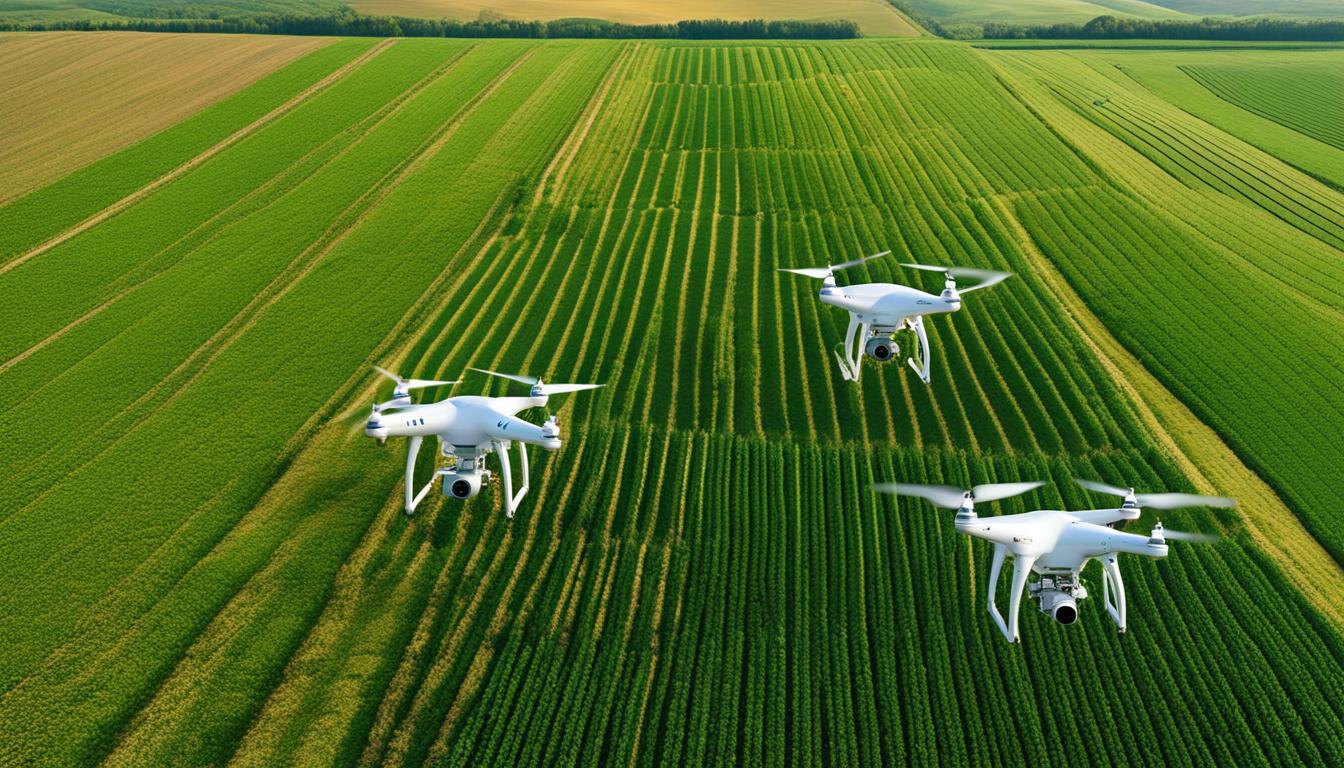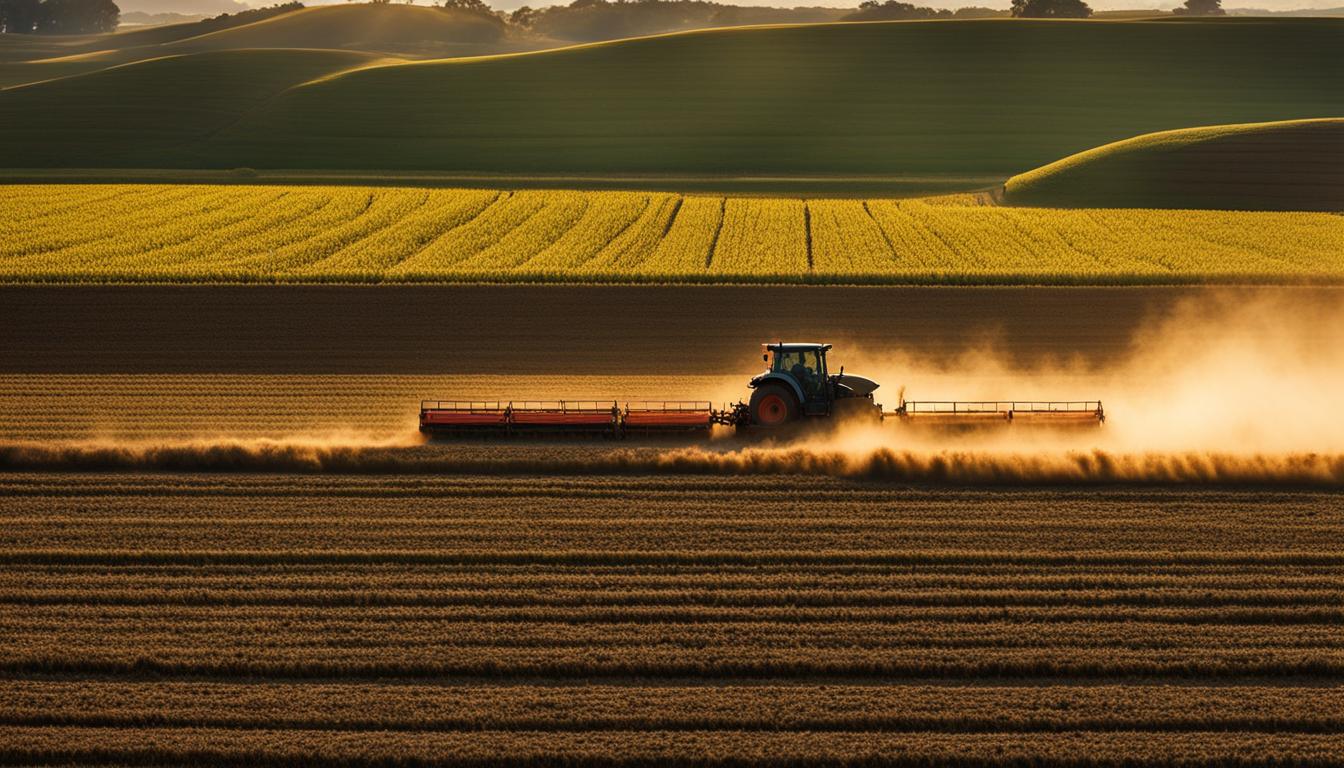In 2024, CNC machining technology is set to revolutionize the agricultural industry with innovative applications. Precision farming solutions powered by CNC technology will enable farmers to automate agricultural machinery, improve productivity, and enhance the efficiency of farming operations.
CNC tools will be utilized in various aspects of agricultural practices, from precision planting and harvesting to livestock management. This advanced technology will pave the way for the future of farming, offering increased precision, reduced labor, and improved sustainability in agriculture.
Top Precision Agriculture Trends in 2024
The year 2024 is set to witness a wave of technological advancements in precision agriculture, with several key trends emerging. These trends will revolutionize farming practices and drive the industry towards increased efficiency, productivity, and sustainability. From satellite technology to artificial intelligence, here are the top precision agriculture trends to watch out for in 2024:
1. Satellite Technology
- Real-time data collection and improved crop monitoring
- Enhanced precision in decision-making processes
2. Internet of Things (IoT)
- Real-time data gathering on crop and field variability
- Improved farm management practices
3. Artificial Intelligence (AI)
- Data-driven insights and predictions
- Efficiency enhancements in agricultural processes
4. Variable Rate Technology (VRT)
- Optimized resource usage and reduced waste
5. Agricultural Robotics and Drones
- Automation of farm operations
- Increased productivity and reduced labor requirements
6. Big Data & Analytics
- Valuable insights for improved decision-making and farm management
7. Emission Reduction Technology
- Control of carbon dioxide emissions and promotion of sustainable farming practices
These precision agriculture trends in 2024 hold immense potential for transforming the agricultural industry, offering farmers innovative solutions to enhance productivity, reduce environmental impact, and achieve sustainable farming practices.
The Impact of Precision Agriculture Trends
Precision agriculture trends in 2024 are set to have a profound impact on the agricultural industry. These trends, driven by advancements in technology, will revolutionize farming practices and improve efficiency, productivity, and sustainability. From satellite technology to artificial intelligence and robotics, farmers will benefit from a range of innovative solutions that optimize resource usage and reduce waste.
One of the key trends in precision agriculture is the use of satellite technology for real-time data collection and monitoring. This enables farmers to make informed decisions based on accurate and up-to-date information. IoT devices also play a crucial role by providing farmers with real-time data on crop variability and field conditions. This data can be used to optimize planting and irrigation strategies, leading to improved crop yields and reduced resource wastage.
Artificial intelligence (AI) is another trend that will significantly impact precision agriculture in 2024. AI-powered analytics and predictive models will help farmers make data-driven decisions, enhance the efficiency of agricultural processes, and optimize resource allocation. This technology will also enable the automation of certain farm operations through the use of robotics and drones, reducing the need for manual labor and increasing productivity.
The Role of Precision Agriculture Startups
Precision agriculture startups will play a crucial role in driving the adoption of these innovative technologies. These startups are developing cutting-edge solutions that leverage CNC machining and other advanced technologies to improve precision, efficiency, and sustainability in agriculture. By providing farmers with access to these technologies, startups are democratizing precision agriculture and making it more accessible to smaller farms and agricultural communities.
| Startup | Location | Product/Service |
|---|---|---|
| 701x | USA | Cattle tracking solutions for large-scale farms and ranches |
| Sensefarming | Ukraine | GIS mapping solutions for field analysis and soil mapping |
| UBIQ-IoT | Italy | Weather monitoring and smart farming solutions using cloud-based IoT technology |
| ESI SYSTEM | Spain | Digital precision agriculture sensors and probes for climate and soil monitoring |
These startups are driving innovation in precision agriculture by developing solutions that address key challenges in the industry. By leveraging CNC machining and other advanced technologies, they are enabling farmers to optimize their operations, increase productivity, and reduce their environmental footprint. The impact of precision agriculture trends and the role of startups in driving innovation will continue to shape the future of farming, paving the way for a more sustainable and efficient agricultural industry.
Promising Startups in Precision Agriculture
In the rapidly evolving field of precision agriculture, several innovative startups are making significant contributions to revolutionize farming practices. These startups are leveraging cutting-edge technologies to develop solutions that improve precision, efficiency, and sustainability in agriculture. Let’s take a closer look at some of the most promising startups in precision agriculture:
701x
701x, a US-based company, specializes in cattle tracking solutions for large-scale farms and ranches. Their advanced technology enables farmers to monitor the health and location of their livestock in real-time, optimizing herd management and ensuring the well-being of the animals. By leveraging precision tracking systems, 701x helps farmers improve productivity and streamline their operations.
Sensefarming
Sensefarming, a Ukrainian startup, offers GIS mapping solutions for field analysis and soil mapping. Their technology enables farmers to gather detailed data on soil characteristics, moisture levels, and nutrient distribution. By harnessing this information, farmers can make data-driven decisions to optimize planting strategies, fertilizer application, and irrigation practices, leading to improved crop yields and resource efficiency.
UBIQ-IoT
UBIQ-IoT, an Italian startup, provides weather monitoring and smart farming solutions using cloud-based IoT technology. Their sensors collect real-time weather data, helping farmers make informed decisions regarding irrigation, pest control, and crop protection. By integrating weather data with farm management systems, UBIQ-IoT empowers farmers to optimize resource usage and minimize environmental impact while maximizing crop productivity.
ESI SYSTEM
ESI SYSTEM, a Spanish startup, specializes in digital precision agriculture sensors and probes for climate and soil monitoring. Their technology allows farmers to monitor temperature, humidity, soil moisture, and other environmental factors crucial for crop growth. By providing accurate and timely data, ESI SYSTEM enables farmers to optimize irrigation, implement climate control measures, and mitigate risks associated with adverse weather conditions.
These startups exemplify the transformative potential of precision agriculture. By harnessing technology and innovation, they are driving the industry forward, making farming more efficient, sustainable, and profitable. As these startups continue to evolve and scale their operations, they have the potential to shape the future of agriculture and address the modern challenges faced by farmers around the world.
The Growing Market for AI in Agriculture
The market for artificial intelligence (AI) in agriculture is experiencing rapid growth and is projected to expand significantly in the coming years. AI technology offers immense potential for improving farming practices through data-driven insights and automation. According to industry experts, spending on AI in agriculture is expected to increase from $1.7 billion in 2023 to $4.7 billion in 2028, with a compound annual growth rate (CAGR) of 23.1%.
AI solutions are revolutionizing various aspects of agriculture, from crop yield estimation and weather forecasting to pest control and resource optimization. With AI-powered analytics and predictive models, farmers can make data-driven decisions that minimize the environmental impact of farming operations. They can also optimize resource usage, reduce waste, and enhance sustainability. AI-powered robots and drones are being developed to automate farm operations, reducing labor requirements and improving efficiency.
The adoption of AI in agriculture is expected to have a profound impact on the industry, shaping the future of farming. By leveraging AI technology, farmers can enhance productivity, improve decision-making processes, and address the challenges posed by a growing global population and limited natural resources. As AI continues to advance, it holds great promise for transforming the agricultural sector and promoting sustainable farming practices.

The Benefits of AI Technology in Agriculture
- Enhanced productivity and efficiency in farming operations
- Improved decision-making through data-driven insights
- Optimized resource usage and reduced waste
- Sustainable farming practices and environmental conservation
- Automation of farm operations through AI-powered robots and drones
Key Trends in AI for Farming
| Trend | Description |
|---|---|
| Machine Learning | AI algorithms that enable computers to learn from and make predictions or decisions based on data |
| Computer Vision | AI technology that enables machines to analyze and interpret visual data, such as crop health monitoring and disease detection |
| Natural Language Processing (NLP) | AI technology that enables machines to understand and interpret human language, facilitating interactions between farmers and AI systems |
| Internet of Things (IoT) | Integration of AI with IoT devices for real-time data collection and analysis, enabling precision farming practices |
| Robotics | AI-powered robots that automate various farm operations, such as planting, harvesting, and weed control |
The Role of AI in Sustainable Agriculture
Artificial intelligence (AI) is set to play a crucial role in promoting sustainable agriculture practices in 2024. AI enables farmers to optimize resource usage, reduce waste, and enhance environmental conservation efforts. Through the use of AI-powered analytics and predictive models, farmers can make data-driven decisions that minimize the environmental impact of farming operations. AI also aids in precision agriculture techniques, such as precision planting and irrigation, which reduce the use of water, fertilizers, and pesticides. Additionally, AI-powered robots and drones can monitor and manage crops more efficiently, leading to improved sustainability and reduced crop losses. The integration of AI into sustainable farming practices will drive the industry towards a more sustainable and environmentally friendly future.
One of the significant benefits of AI in sustainable agriculture is its ability to optimize resource usage. By analyzing various data points, such as soil composition, weather patterns, and crop health, AI algorithms can provide real-time insights on the most efficient ways to allocate resources like water and fertilizers. This helps to minimize waste and reduce the environmental impact of farming practices. AI-powered precision irrigation systems, for example, can automatically adjust water flow based on crop needs, ensuring that water is used efficiently and not wasted.
AI also plays a vital role in crop management and disease control. Through image recognition algorithms and machine learning, AI can analyze images of crops and identify signs of pest infestation or disease. This allows farmers to take immediate action, preventing the spread of pests or diseases and reducing the need for excessive pesticide use. By targeting specific areas and using precise amounts of pesticides or other treatments, farmers can minimize the impact on the environment while still effectively protecting their crops.
| Benefits of AI in Sustainable Agriculture | Examples |
|---|---|
| Optimized resource usage | AI-powered precision irrigation systems |
| Improved crop management and disease control | AI image recognition algorithms for pest and disease identification |
| Reduced environmental impact | Precise application of pesticides and fertilizers |
| Increased efficiency and productivity | AI-powered robots and drones for farm operations |
Furthermore, AI-powered robots and drones are revolutionizing farm operations, improving efficiency, and reducing labor requirements. These autonomous systems can perform tasks such as planting, harvesting, and monitoring crops with precision and accuracy. By automating manual labor, farmers can optimize their workforce and utilize their resources more efficiently. This not only reduces costs but also increases overall productivity, making sustainable agriculture more economically viable.
In conclusion, AI holds immense potential in transforming sustainable agriculture practices. Its ability to optimize resource usage, improve crop management, reduce environmental impact, and increase productivity makes it a valuable tool for farmers looking to implement sustainable farming techniques. As AI technology continues to advance, its role in agriculture will only become more significant, paving the way for a greener and more sustainable future.

Future Prospects of CNC Machining in Agriculture
The future of CNC machining in agriculture holds immense potential for revolutionizing the industry and shaping the future of farming. With technology evolving at a rapid pace, CNC tools will play an increasingly important role in transforming farming practices, bringing forth innovations that improve efficiency, accuracy, and productivity.
These CNC machining innovations in farming will be utilized in various agricultural processes, including precision planting and harvesting. By integrating CNC technology into these practices, farmers will experience increased precision and reduced labor, leading to improved overall efficiency.
Looking ahead, the integration of CNC machining with emerging technologies such as IoT, AI, and robotics will bring even more advancements to the agricultural industry. With automated farm operations, real-time data analysis, and predictive models, CNC machining will pave the way for sustainable farming practices that promote productivity and environmental stewardship.
In conclusion, the future of CNC machining in agriculture is promising. As technology continues to advance, CNC tools will play a vital role in revolutionizing the industry, ensuring precision, productivity, and sustainability in farming practices for years to come.
